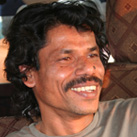Future Generations University Alumni

Practicum Summary: Water Pollution and Social Change in Bandladesh
Shahidul’s study seeks to understand and explain how industrialization and its pollutive effects to rivers induce social change to protect the environmental, ecology, and livelihoods around the Bangshi River. The Bangshi River is an important tributary of the Barhamaputra-Jamuna river system in Bangladesh and also a main resource for local people of Ghughudia. This research focuses on options for sustainable and environmentally friendly industrialization for community change and improvement of the economy and employment rate in Bangladesh, specifically in the village of Ghughudia. Two questions were examined: 1) What are the perceptions of different actors in regards to water pollution, and 2) How can these actors be mobilized to reclaim the rights of the people? To gather qualitative information, Shahidul conducted focus group discussions, in-depth interviews, and descriptive surveys. The representative stakeholder groups include fishermen, farmers, small businesses, milkmen, and students from Ghughudia, while owners of industry, politicians, media counterparts, and civil servants were identified outside of the Ghughudia village. In order to promote social change, Shahidul recommends identifying stakeholders interests and encouraging behavioral change, education on environmental water management, capacity building for local government, advocating for consumer awareness, and an overall environmental campaign backed by livelihood opportunities.

Practicum Summary: Exploring the Contributions of Village “WASH” Committees in Achieving “WASH” Program Objectives and the Empowerment of Rural Women in Bangladesh
Razaul Karim’s research practicum focuses on the study of the contribution of Village Water, Sanitation, and Hygiene (WASH) Committees to achieve the WASH program objectives and to empowering the rural women of Bangladesh. Village Wash Committees address existing water and sanitation situations of their village and identify issues that require urgent action. VWCs focus on reaching the poor, providing hygiene education to the entire population, and focusing on women’s participation in decision-making. Karim measured women’s empowerment by using seven indicators: voluntary efforts and active participation, ability to influence major decision-making, expression of voice, knowledge and skills, freedom of mobility, control over resources, and self image, sense of self-confidence, and leadership roles. Using questionnaires, interviews, observations, focus group discussions and document analysis, Karim found that VWCs, cluster meetings, and informal interactions have helped women to improve their social capital and sense of empowerment. Women were found to be more engaged during VWC meetings and capable of making more decisions at home. In addition, women were also found to have more ability to interact with elected officials, and waterborne diseases decreased in result to VWCs. Overall, Karim concluded that knowledge and awareness-building interventions such as the Village Wash Committees, require community participation in order to procure the most positive, effective results.

